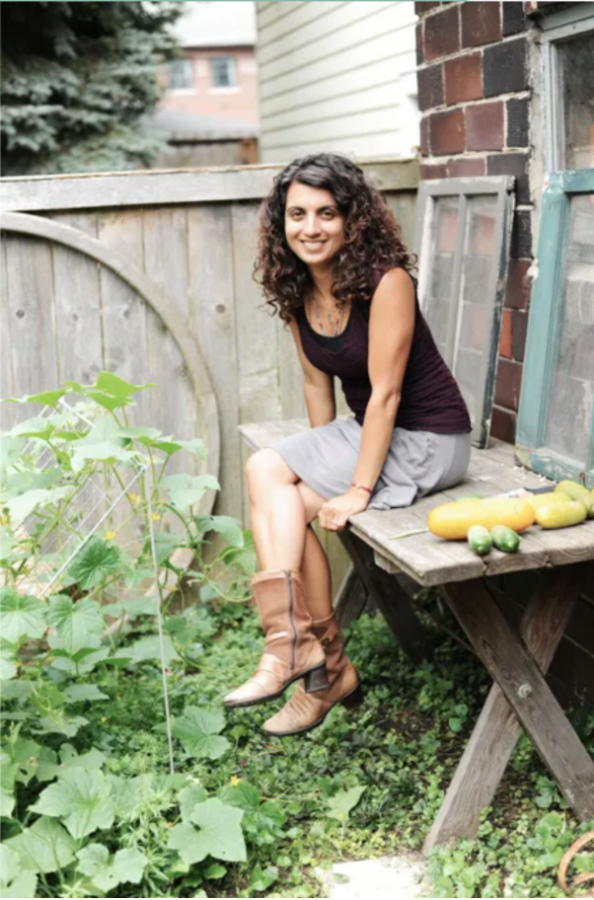NU Grad Dr. Geeta Maker-Clark focuses on culinary justice in her work
Photo courtesy of Geeta Maker-Clark
Dr. Geeta Maker Clark is the Director of Integrative Nutrition and Advocacy at NorthShore University Health Systems and is passionate about advancing culinary medicine.
November 22, 2021
When Dr. Geeta Maker-Clark (Weinberg ‘94) thinks about her patients’ nutritional health, she doesn’t imagine the food pyramid. Instead, the physician considers the overall impact of social factors like access to nutrition and lifestyle on their health.
In her roles at NorthShore University Health Systems, the University of Chicago and the Montessori School of Englewood, Maker-Clark centers what she calls “food as medicine” or “culinary medicine,” teaching proper nutrition concepts to patients, students and fellow doctors. Through these methods, she helps patients identify and access high-quality foods, which she said can help treat chronic disease.
“When I’m with a patient, it’s just me and them and I’m dialed completely into whatever they want to share about their life experience,” she said. “Sometimes that isn’t the obvious, ‘This hurts,’ or, ‘I want this test.’ Sometimes people don’t feel well, and we have to explore what is in their life and their lifestyle that is contributing to this feeling.”
Her focus on nutrition really developed when she was an attending physician in California. As a new mother, she was responsible for another person’s nutrition for the first time — and she was seeing the impact of nutrition on her patients in real time.
Many of her patients were migrant farmworkers who weren’t able to access the very food they were farming. For these patients, Maker-Clark said she refocused to implement holistic, accessible interventions for serious health conditions.
“There was a very important intersection of food, nutrition, responsibility, mothering, justice and food access that were all coming together during those years I lived in California,” Maker-Clark said.
Dr. Rahul Sharma met Maker-Clark 25 years ago when she was a speaker for an Association for India’s Development event.
He said Maker-Clark’s work has brought him to develop a more positive philosophy on nutrition, which he implemented in raising his own children.
“We focus on the positive side with mindful eating,” Sharma said, “instead of the shame side.”
Following her work in California and fellowship in Integrative Medicine at the University of Arizona, she returned to the Midwest passionate about a new approach that de-emphasized pharmaceutical intervention.
Now, Maker-Clark is the director of integrative nutrition and advocacy at NorthShore, where she has implemented “culinary medicine” practices beyond her office. Dr. Bernard Ewigman, chair of family medicine at North Shore, said all of North Shore University Health Systems’ employees now enjoy a salad bar because of Maker-Clark, who took it upon herself to improve staff availability to healthy options.
“I went down one day and there was a salad bar full of vegetables and healthy food,” he said. “I found out she had been working with nutrition and facilities, and convinced them to shift their purchasing, shift their menus, reduce the amount of food with additives, and substitute green, healthy whole foods.”
Maker-Clark has also brought culinary medicine concepts to middle-school students in Englewood, as well as medical students at the University of Chicago.
Her middle school course, taught at the Montessori School of Englewood with the assistance of UChicago students, is called “Food is Power.” She said she wants these future physicians to be comfortable prescribing food as medicine and talking to patients about food and nutrition.
Maker-Clark said the class teaches culinary medicine through a culturally competent lens. Instead of prescribing a set of foods she wants students to eat, she teaches the history of foods specific to the Englewood neighborhood.
“I work with the middle schoolers to create healthy and delicious food that is from an evoked food vocabulary they already have,” Maker-Clark said. “The concept of ‘Food is Power’ is to truly empower students to understand the choices they make around food.”
Maker-Clark said she ultimately wants to foster a patient network using nutritional concepts to support their individual health while de-emphasizing traditional concepts like the food pyramid.
“It all fits into a justice and equity framework,” she said. “Patients need doctors who are fluent in talking about food and nutrition because it shouldn’t be something a few doctors specialize in. We need to increase the number of physicians literate in this type of work.”
Email: [email protected]
Twitter: @avanidkalra
Related Stories:
— South Asian Women of Evanston fosters community for South Asian Evanston residents
— East meets West: Local clinic offers integrative care
— Northwestern Medicine starts project to mitigate food deserts in Chicago


